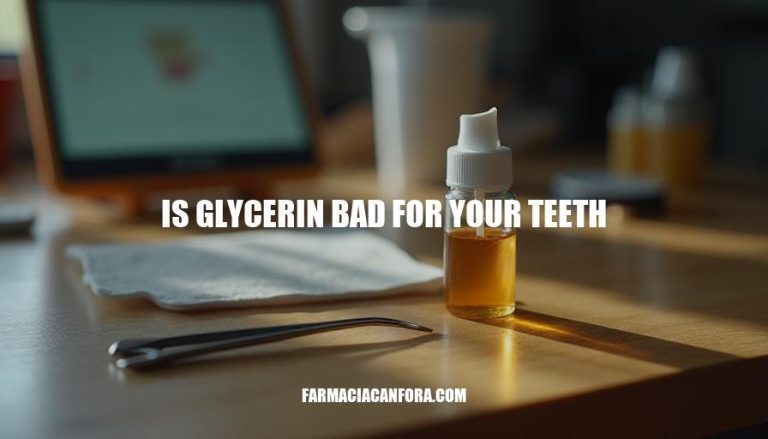


The question of whether glycerin is bad for your teeth has sparked growing concern and debate. Some argue that glycerin, commonly found in toothpaste, might coat teeth and hinder remineralization, potentially leading to dental issues. Others believe these claims are unfounded, emphasizing glycerin’s role in maintaining moisture and texture in oral care products. This ongoing discussion highlights the need for clarity on glycerin’s impact on dental health.
Glycerin is a colorless, odorless, and sweet-tasting liquid derived from plant oils or animal fats. It is widely used in various industries due to its moisturizing and humectant properties.
Common uses of glycerin in dental products include:
These properties make glycerin a valuable ingredient in maintaining oral hygiene and comfort.
Here are the main arguments and claims made by those who believe glycerin is bad for your teeth:
Coating Teeth: Glycerin is said to coat the teeth, forming a barrier that prevents the absorption of minerals necessary for remineralization. This idea was popularized by Dr. Gerard Judd, who argued that glycerin in toothpaste inhibits the natural process of remineralization, essential for maintaining strong teeth.
Plaque Magnet: Some claim that glycerin attracts plaque and bad bacteria, leading to gum disease, bad breath, and tooth decay.
Remineralization Inhibition: The primary concern is that glycerin prevents the enamel from absorbing minerals, thus hindering the natural repair and strengthening process of the teeth.
Protective Barrier Misconception: While glycerin is believed to form a protective barrier, critics argue that this barrier is detrimental because it blocks essential minerals from reaching the enamel.
These arguments are part of a broader debate within the natural health community about the safety and efficacy of glycerin in oral care products.
Supporting Claims:
Refuting Claims:
Glycerin is a common ingredient in dental products, primarily used for its humectant properties, which help keep products moist. However, there are some concerns and potential risks associated with its use:
Remineralization Concerns: Some believe that glycerin can coat the teeth and potentially inhibit the natural remineralization process. This theory suggests that glycerin forms a barrier that prevents minerals from being absorbed by the enamel. However, this claim lacks strong scientific support, and glycerin is water-soluble, meaning it can be washed away by saliva or water.
Bacterial Growth: Glycerin is classified as a sugar alcohol, which can enhance bacterial biofilms. This might increase the likelihood of developing cavities by promoting plaque build-up. For individuals with existing cavities or tooth decay, this could potentially exacerbate their condition.
Plaque and Biofilm Formation: There are claims that glycerin contributes to dental biofilm, leading to plaque build-up. This could be particularly problematic for individuals already struggling with tooth decay, as it might worsen their dental health.
Protective Barrier: On the flip side, some argue that glycerin forms a protective layer on the teeth, preventing harmful substances from adhering to the tooth’s surface. This could potentially reduce the risk of decay, although this benefit is still debated.
In summary, while glycerin is generally considered safe in dental products, individuals with cavities or tooth decay might want to be cautious due to its potential to enhance bacterial growth and plaque formation. It’s always a good idea to consult with a dental professional for personalized advice.
Dental professionals have mixed views on whether glycerin is bad for your teeth:
Dr. Mark Burhenne, DDS: He argues that the claim glycerin prevents remineralization is a myth. He states, “Glycerin is water-soluble and any coating it may leave on teeth can be easily washed away by saliva or water, allowing minerals to reach the enamel”.
Dr. Roland Zhuka: He emphasizes that there is no solid evidence proving glycerin is harmful. He mentions, “The majority of authors who say glycerin doesn’t aid in the prevention of remineralization state that there doesn’t exist any study proving that glycerin is an issue”.
Royal Dental Clinics: They highlight potential risks, noting, “Glycerin can disrupt the pH levels in your mouth, allowing harmful bacteria to grow, which can lead to cavities and other oral health issues”.
biöm: They acknowledge that while glycerin is not inherently bad, it might be harmful for individuals needing remineralization, such as those with cavities or tooth decay.
Overall, the consensus seems to be that glycerin is generally safe, but its effects can vary depending on individual dental health needs.
The debate surrounding glycerin’s impact on dental health has sparked controversy, with some arguing it coats teeth and hinders remineralization, while others claim it maintains moisture and texture in oral care products.
Glycerin is widely used in toothpaste, mouthwash, and composite restorations due to its moisturizing properties. However, concerns have been raised about its potential effects on dental health, including coating teeth, attracting plaque, inhibiting remineralization, and forming a protective barrier that may be detrimental.
While some studies suggest glycerin can disrupt pH levels and promote bacterial growth, others argue it is water-soluble and easily washed away, allowing minerals to reach the enamel.
Dental professionals have mixed views on the matter, with some stating there is no solid evidence proving glycerin is harmful, while others highlight potential risks for individuals needing remineralization.
Ultimately, the consensus seems to be that glycerin is generally safe but its effects can vary depending on individual dental health needs.